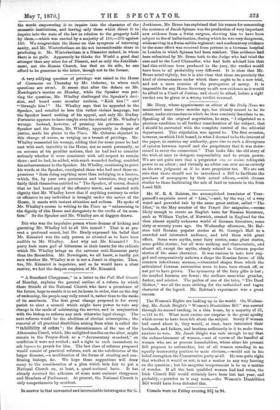A very edifying question of privilege was raised in the
House of Commons on Thursday by Mr. Osborne, to whom such questions are sweet. It -seems that after the debate on Mr. Newdegate's motion on Monday, while the Speaker was put- ting the question, Mr. Whalley challenged the Speaker's deci- sion, and heard some member exclaim, "Kick him ! " and 4, Strangle him !" 'Mr. Whalley says that he appealed to the Speaker, and retailed to him this rather .violent language, but the Speaker heard nothing of his appeal, and only Mr. Dudley Fortescue appears to have caught even the recital of Mr. Whalley's wrongs. Instead, however, of pressing his grievance on the Speaker and the House, Mr. Whalley, apparently in despair of justice, made his plaint to the Times. Mr. Osborne objected to this change of venue, as verging on a breach of privilege. Mr. Whalley reasserted his wrongs, adding that for some years he had met with such incivility in the House, not so much personally, as on account of his peculiar notions, that he had had to consider -seriously whether it were consistent with self-respect to remain *here; and he had, he added, with much wounded feeling, confided this embarrassment to the Speaker. Mr. Whalley, continuing to point his words at the Speaker, exculpated those who had used these ex- pressions "from doing anything more than indulging in a licence, -which, Sir, by your own permission and toleration, they might fairly think themselves entitled to." The Speaker, of course, denied that he had heard any of the offensive words, and asserted with dignity that Mr. Whalley knew that if anything contrary to order or offensive to any individual is brought under the notice of the House, it meets with instant attention and redress. He spoke of 21r. Whalley's course in writing to the Times as "unbecoming to the dignity of this House and derogatory to the credit of its mem- bers." So the Speaker and Mr. Whalley are at daggers drawn.






























 Previous page
Previous page